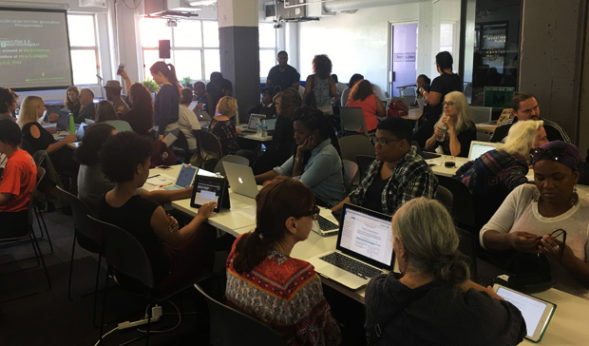
LOS ANGELES — On Sunday, November 6th, close to one hundred volunteers showed up at Impact Hub here to engage in a “text-a-thon” to encourage millions of Black voters in the battleground states of Ohio, Florida, North Carolina, Florida, Pennsylvania, and Texas to get out and vote in this Tuesday’s election. The California “text-a-thon”, the act of sending out millions of personalized phone texts to registered voters, was one of several happening across the country days before the election. The event, which was organized by the racial justice nonprofit Color of Change as part of a campaign entitled Voting While Black, was intended to “actively encourage Black people to show up in force for races up and down the ballot.”
The campaign comes at a crucial time as African-Americans, although surpassing their white counterparts in the presidential election of 2012 with voter turnout (66 percent versus 64 percent) for the first time in history, continue to face unjust voter suppression that has created constant barriers in exercising their voices in the political sphere. Some 51 years after the historic Voting Rights Act of 1965, a wave of new voting laws has emerged in the Southern states, potentially disenfranchising a large percentage of the roughly 3.72 million unregistered African-Americans in the region as of 2012. Color of Change’s political advocacy arm, Color of Change PAC, says it is looking to combat this suppression. (story continues after video)
Voting While Black, as explained by Color of Change, uses digital communications to arm voters with information as they go to the polls. Volunteers use their tablets to target voters in specific areas, sending out an initial text to encourage them to vote. If the receiver of the text responds, volunteers are encouraged to engage respectively in order to talk to the voter about their thoughts regarding the elections. Color of Change PAC has acquired access to African-Americans’ mobile devices in key battleground states and where there are important district attorney races.
Rashad Robinson, Color of Change’s executive director, explained to the Los Angeles volunteers on Sunday that this campaign came about because: “No one [politicians] was nervous about disappointed Black people,” and that the aim of this initiative is to “build independent Black political power, and to make politicians nervous about disappointing the Black community.” Speaking further, Robinson noted, “Black turnout will influence this election. We have engaged with over 1.5 million voters in conversation and texts and close to 8 million voters via Twitter and Facebook.”

The Voting While Black campaign also seeks not to only to make an impact in the presidential race, but down the ballot as well. Speaking to the need to hold district attorneys accountable, Robinson said, “Eighty-five percent [of district attorneys] run unopposed. They hold influence in police accountability. Prosecutors are the single most powerful people in the criminal justice system, they have the most discretion to determine how people in the system are treated.”
On their website, Color of Change cites four main goals for the initiative:
- Holding prosecutors, who have previously run unopposed, accountable to our communities.
- Pushing or stopping ballot initiatives that impact our communities- issues including minimum wage, cuts to public infrastructure, and gun control.
- Supporting a diverse slate of candidates working on improving public education, tackling climate change, alleviating student loan debt and challenging redistricting.
- A more progressive Supreme Court.
Having attracted celebrities throughout the campaign, this Sunday’s event in Los Angeles saw popular actress Meagan Good, her husband, author and preacher DeVon Franklin, and actor Kendrick Sampson, also volunteering to send out texts to voters. Good expressed to the large room of volunteers, “We have to use the heart and the connection to convey to people that their voice and vote make a difference.” Good’s husband Franklin added, “It’s a ripple effect. It is important to let people know who we are, what we stand for, and what we [Black people] deserve. This [right to vote] has been bought and paid for by the blood of our ancestors.”
The campaign is also looking beyond this Tuesday’s elections. “After the elections we’re switching to political accountability,” Robinson explained. “We will be around for the 2017 district attorney elections, the 2018 mid-term elections, the 2020 presidential elections, and beyond, engaging the Black vote.”










